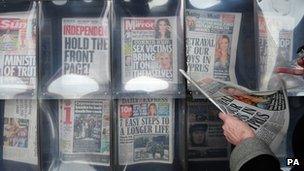Leveson report: Press regulation plans face legal challenge
- Published

Politicians and the newspaper industry have failed to agree how the press should be regulated
A newspaper industry group is to seek a judicial review after its regulation plans were rejected earlier this month.
The Privy Council, which rejected the industry plans, had been expected to rubber stamp a plan agreed by the main Westminster parties in the next week.
Opponents say this plan could result in the end of the free press and hope the legal move will delay its approval but the government says it will push ahead.
The row follows the phone-hacking scandal and subsequent Leveson inquiry.
A newspaper industry source said the judicial review application would be formally lodged in the High Court on Monday.
One senior industry source also said they hoped the bid for a review would put a "spoke in the wheels" of the Westminster plan.
"It's very hard to imagine them proceeding next week to file their Royal Charter when the previous decision is subject to judicial review," he said.
'Singularly failed'
Some in the industry have warned that a system decided by politicians risks bringing an end to press freedom.
The Newspaper Society said the press's preferred charter was not handled fairly as the Privy Council committee - which is set to agree the final proposals on 30 October - failed to consult the press.
The judicial review application will be made by Pressbof (Press Standards Board of Finance), the industry body that funds the current Press Complaints Commission.
Pressbof's chairman Lord Black of Brentwood said: "The government and the Privy Council should have applied the most rigorous standards of consultation and examination of the Royal Charter proposed by the industry, which would have enshrined tough regulatory standards at the same time as protecting press freedom.
"They singularly failed to do so, and that is why - as the issues at stake are so extraordinarily high - we are having to take this course of action."
The campaign group which represents some victims of press intrusion, Hacked Off, accused the press of being predictable and self serving.
'No threat'
The group's director Brian Cathcart said: "The people leading this part of the newspaper industry are exposing themselves as desperate and deaf.
"Desperate, because they are now resorting to a legal challenge to something based on the findings of a public inquiry, and backed by the victims of press abuse, all parties in Parliament and the overwhelming majority of the public.
"Deaf, because they refuse to listen to the evidence that there is no threat to the free press and that this deal actually benefits the press, both financially and in terms of freedom of expression."
Meanwhile, the press is highlighting plans to set up its own regulator under its own rules.
Documents including a contract to bind publishers and the regulations under which a new regulator would work were due to be published online at 19:00 BST. They expect the new regulator to be operating by next year.
A spokesman for the Department of Culture, Media and Sport commented: "The government is working to bring in a system of independent press self-regulation that will protect press freedom while offering real redress when mistakes are made.
"The culture secretary pushed hard for recent changes on arbitration and the standards code to be made, which will ensure the system is workable and the decision to go to court is particularly disappointing in light of these changes."